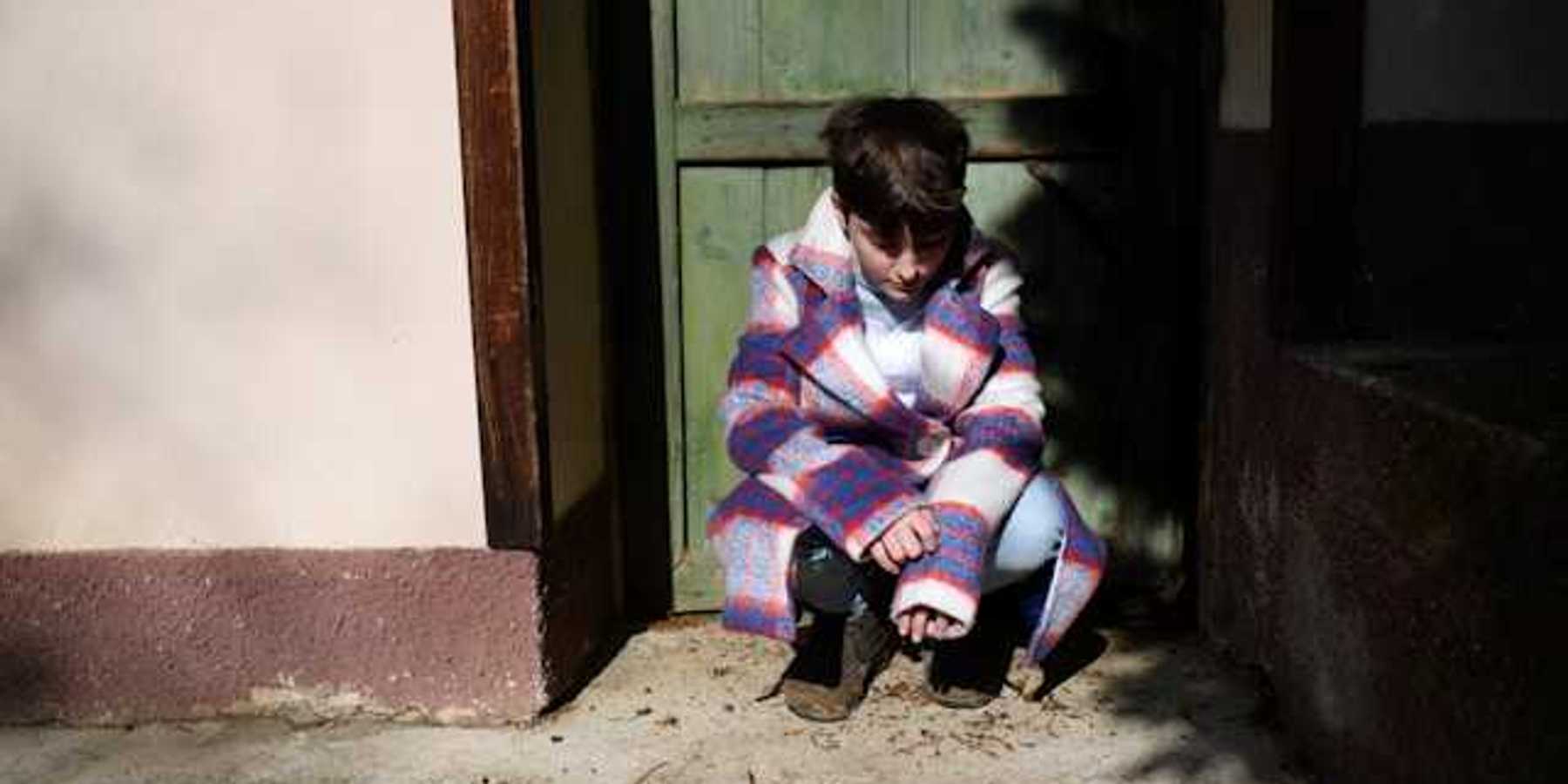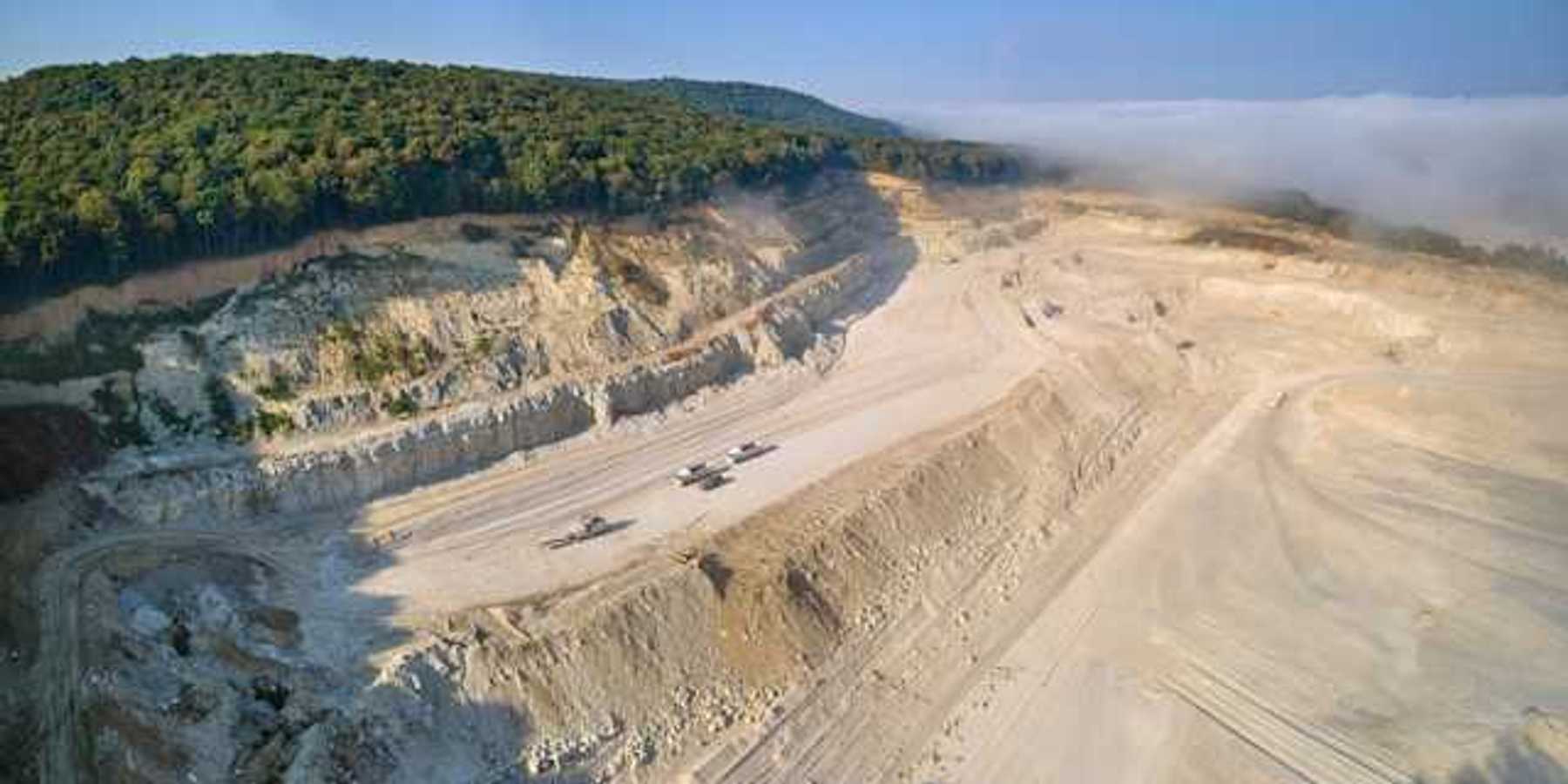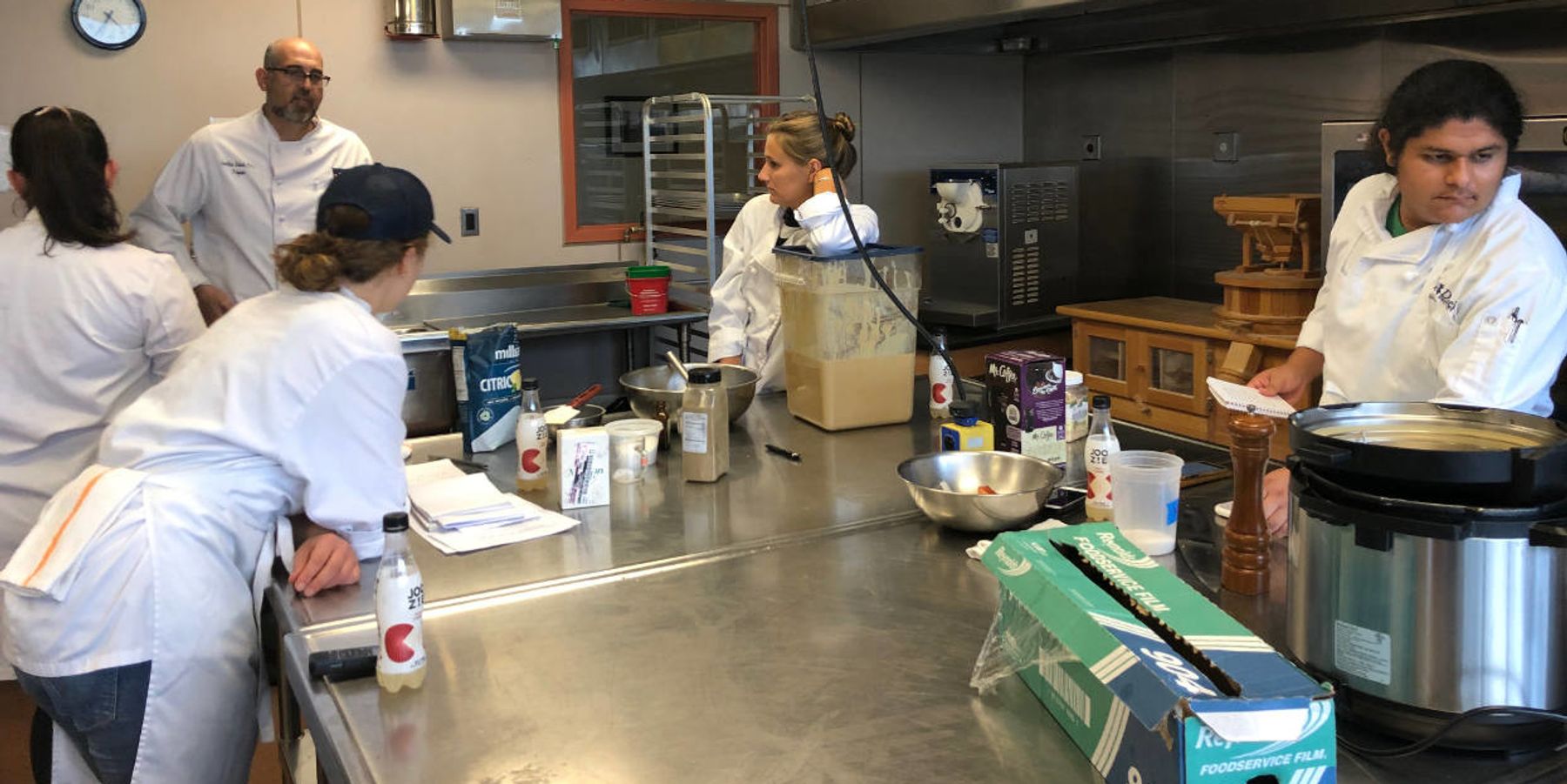
From avocado drinks to repurposed lard: Using creativity and culture change to tackle Philly food waste
Nearly 20 percent of people in Philadelphia are food insecure. We visited the researchers, restaurateurs, and entrepreneurs changing this by rethinking food waste.
PHILADELPHIA—Sheetal Bahirat was making a big batch of guacamole when she realized her leftover avocado seeds were food waste.
"I was like, 'I'm a food waste researcher. This is so ridiculous if I throw this away. I have to find out what I can do with it,'" she told me as we sat in an industrial-sized kitchen.
Bahirat is a graduate student studying food science in Drexel University's Food Lab, where students work with companies and nonprofits to help create new food products – some from food that would otherwise be wasted. The lab refers to this as " upcycling" food.
Food waste is a major problem: Around 30 to 40 percent of the U.S. food supply goes uneaten. Produce and dairy products are among the most common foods thrown away, since they spoil quickly.
At the same time, one in eight Americans is food insecure, meaning they lack regular access to nutritious, affordable food. In Philadelphia, where Drexel University is located, this number is closer to one in five.
Food waste comes from many sources, including consumers, restaurants, farmers, and grocery stores. The average family of four wastes between $1,350 to $2,275 of food each year. Sometimes this is due to overbuying. Other times, it's because people misinterpret the dates stamped on food packaging, which actually have little to do with whether food is safe to eat.
Food waste is also a waste of the energy and resources that go into food production. While donating excess food would help solve world hunger, reducing the amount of food produced in the first place would lower greenhouse gases (food waste currently contributes 8 percent of global greenhouse gas emissions). Both can be done simultaneously – it's estimated that cutting food waste by 25 percent worldwide could feed everyone in the world who is malnourished.
The Drexel Food Lab works with local businesses and nonprofits in Philly along with larger corporate clients to find solutions. The lab plays a key role in finding creative ways to reduce food waste, from turning spotted bananas into ice cream to developing food waste-reducing recipes like tomato spice cupcakes in collaboration with the Environmental Protection Agency.
But it is just one part of a larger community of people from many different fields and backgrounds who are working to reduce waste and repurpose food in Philadelphia and beyond.
Creating something “that has never existed before”
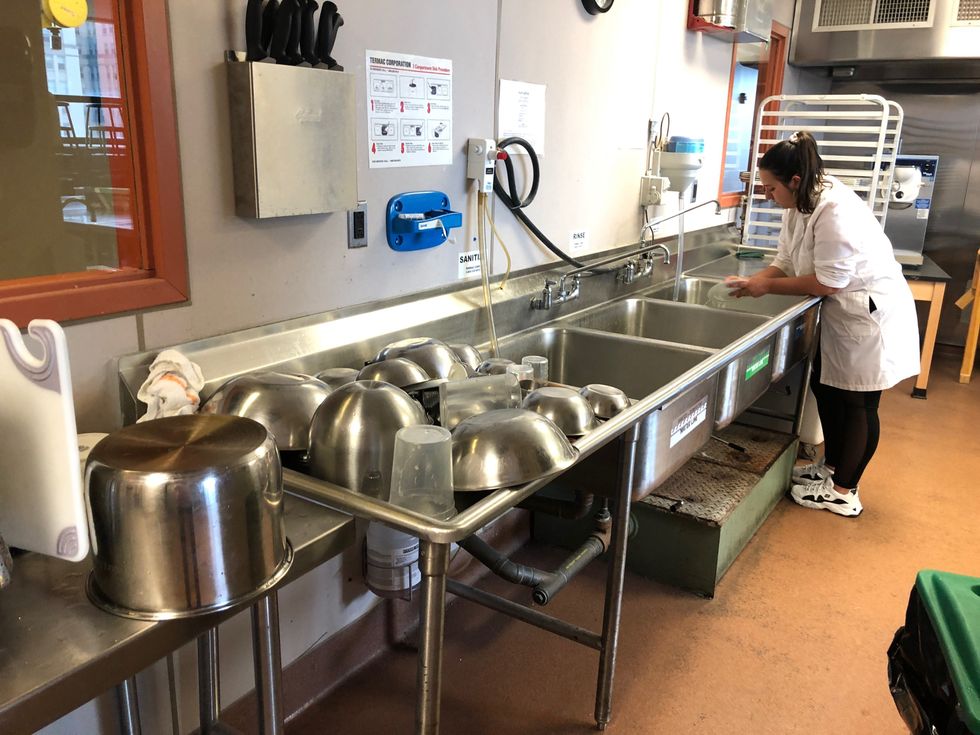
Food Lab student Cecilia Cirne washes a dish after an afternoon of developing and testing new food products. (Credit: Emily Makowski)
When I visited the Food Lab, its members were using one of three kitchens tucked away on a high floor of a Drexel building. The kitchen had the standard equipment—a microwave, ovens, and stoves—along with a wooden flour mill and a stand mixer bigger than a washing machine.
The lab has no set meeting space, since the kitchens are also used by other culinary classes. So members meet wherever they can, their meetings aided by a giant notepad hauled around by Jonathan Deutsch, Professor in the Department of Food and Hospitality Management in the College of Nursing and Health Professions at Drexel University. The notepad details the day's to-do list. Students cook and learn at the same time. "This is a classroom," said Deutsch, gesturing around the kitchen.
Deutsch founded the lab in 2014. Not all of the Food Lab's projects tackle food waste, but over time, the lab's focus has shifted to sustainable food, in part supported by a grant from the Claneil Foundation, which works to improve community health.
"The idea of the Food Lab was initially to engage our students in product development projects for real world clients." Deutsch told EHN. "What we quickly discovered was that there was really no difference between the types of project requests we were getting from industry and good food causes."
By "good food causes," Deutsch means three general areas: sustainability, therapeutic food (the lab has developed protein-filled biscotti bites for selective eaters, including a child with autism who only eats crunchy foods), and food access.
While we talked, four undergraduate students dashed around. They were making reduced-sodium soft pretzels (a healthier spin on a Philly classic), risotto made from sushi rice, and a tahini product.
Bahirat brought out a small plastic jug that held one of the products of a year-and-a-half of her research into avocado seeds. She poured it into several small cups. I took a drink.
The beverage she made from avocado seeds tasted almost citrusy, and a little tart, like an earthy iced tea. It was cold and refreshing on a hot July day, and it was unlike anything I had tasted before. I liked it.
Deutsch, however, was unimpressed. "You're not my target audience for this one," Bahirat told him, laughing.
Bahirat has made a lot of progress; when she first tasted an avocado seed, she didn't think it could be used in food. "It was really bitter," she said. "But as I got into researching the possible benefits of the seeds, I started to realize that there's a lot of antioxidants in them and that they're water soluble. Also, bitter flavors work well in tea-like beverages."
Now, she's co-founded a startup called Avoh! to produce the beverage on a larger scale and recently met with investors.
"It was really exciting to be able to create something that has never existed before," she said.
Out of the lab, into the streets
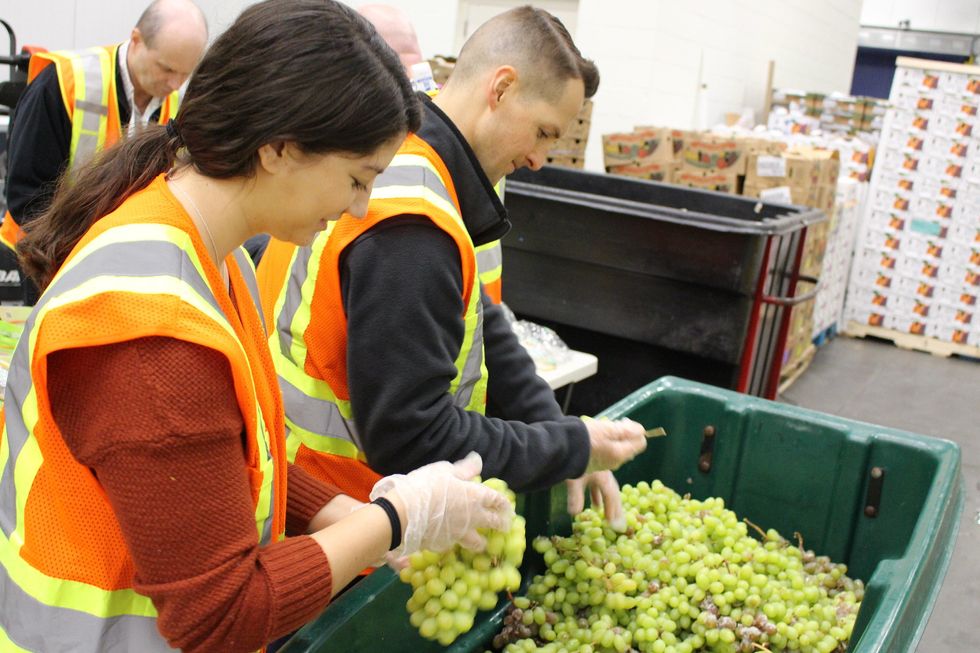
Volunteers working with Philabundance and the Philadelphia Wholesale Produce Market in 2018 to glean produce. (Credit: Produce Marketing Association/flickr)
When not in the kitchen, Bahirat spends most of her time working at Drexel's Baiada Institute for Entrepreneurship. Former Drexel student Evan Ehlers sits nearby. He's not directly affiliated with the Food Lab – he received his bachelor's degree in Entrepreneurship and Innovation in June – but he's co-founder and executive director of Sharing Excess, a nonprofit working to combat food waste.
Sharing Excess uses a team of college student drivers to pick up unused food from grocery stores and restaurants and delivers it to local hunger relief organizations. In the past year, they've delivered more than 88,000 pounds of food. "We're trying to keep that growing at an exponential rate," Ehlers told EHN.
It started in December 2016 when Ehlers found himself in a common situation for college students: he had a lot of dining hall meals left over with only two days left in the term.
"I didn't feel right about going home knowing that the meal swipes would just be gone when I came back and all that food would go to waste," he said. So he went to the dining hall, used up his meal swipes, and put the food into plastic bins. "I took all those meals, put them in the back of my car, and I gave them all out in about an hour and a half," said Ehlers.
The nonprofit was Ehlers's first foray into community service. "I actually was not really that philanthropic before. I never really donated much of my time or donated in general. I just didn't have that many experiences that exposed me to social impact," he said.
It was a life-changing experience. "Going out and seeing it firsthand, seeing people just stacked up, sitting there without food, asking for food, I saw that this was a big problem," he said. Around 400,000 Philadelphians – more than a quarter of the city's total population – live below the poverty line.
As a student studying entrepreneurship, Ehlers decided to turn food donation into a career. He's worked not only with Drexel's dining halls but also with grocery stores such as Trader Joe's.
Liability and logistics
Ehlers has looked to Philadelphia food recovery nonprofit Philabundance for inspiration. As a 30-year-old nonprofit, it has food recovery down to a science, and has partnered with the Food Lab to produce upcycled foods. The organization distributes about 25 million pounds of food every year, Kait Bowdler, director of sustainability at Philabundance, told EHN.
The nonprofit recovers food from a variety of sources, including farms, grocery stores, and factory distributors.
Food waste is everywhere, at all parts of the supply chain: Households contribute about 40 percent of food waste, while the other 60 percent comes from suppliers such as restaurants, grocers, food service companies, and farms.
Why don't more people on the supply side donate food? The number one concern is liability, said Bowdler. Food suppliers often worry they will be held accountable if, after they donate food, it goes bad or is found to harbor unseen illness-causing bacteria.
But they're protected by the Bill Emerson Good Samaritan Food Donation Act. This act, passed in 1996, protects donors and food recovery companies working with "apparently wholesome food" – that is, unspoiled food that meets standards for quality and labeling and is donated with good intentions.
"We have to help promote that act because so [few] people really know about it," Bowdler said.
Another obstacle to donation is that restaurant owners may view it as costly, said Harry Hayman, owner/operator of five restaurants in Philadelphia. He suggested restaurants use spare containers from food deliveries to donate food. "It takes the same amount of effort to scrape food into a container as it does to scrape it into a trashcan," he told EHN. He also mentioned that restaurants can get tax deductions for donating food.
An additional challenge, both for donators and food rescue organizations, is logistics, said Bowdler. "The food out there, what is it, where is it, what time of day is it available? Do we have the right size truck or car? Is it too costly? Would it take hours and volunteers to clean it off of a field? Or is it at lots of tiny restaurants all across the city?" she said.
Philabundance has partnered with grocery stores and chains like Starbucks, but they're also working on getting donations from restaurants. The nonprofit relies on volunteers to help pick up and repackage food products.
Once food is donated, it needs to be matched with someone who needs it. "We have the donors, we have the agencies, but making sure we actually just connect the food is the biggest thing… it's about having the right food at the right time," Bowdler said, adding that recently a senior center contacted Philabundance about donating their extra meals, which was helpful for another senior housing complex in need of food.
“People eat with their eyes”
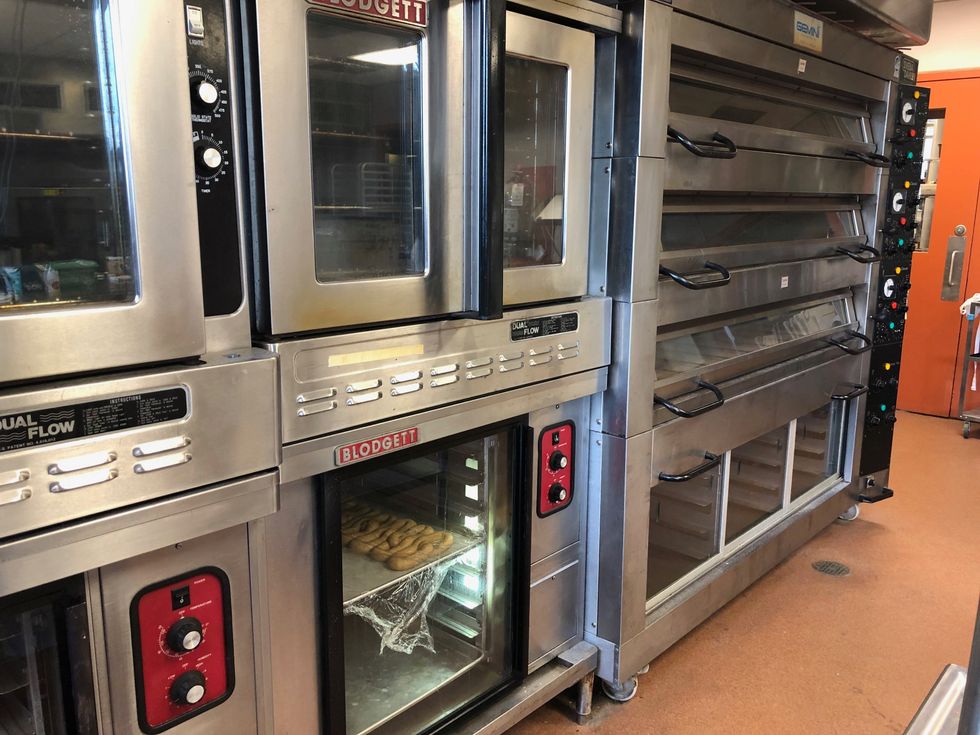
Reduced-sodium soft pretzels bake in an industrial oven at Drexel University's Food Lab. (Credit: Emily Makowski)
A key part of reducing food waste is changing a culture of excess. Customers play a big role in restaurant food waste.
"Unfortunately, from my experience, the prime driver is people not finishing their meal," Michael Oraschewsky of TBJ Gourmet, a company known for its bacon-flavored jam, told EHN at TBJ Gourmet's processing facility in Downingtown, PA (Oraschewsky, as CEO, even goes by Chief Executive Boar in keeping with the bacon theme).
He admits that restaurants often bulk up portions to appeal to customers, even if customers don't eat all the food. "You're selling the time that they're in the seat, and you do that by putting more food on a plate to make it look bigger, so you can charge more money," he said.
Hayman agrees. "People eat with their eyes," he said.
Still, there is a lot of work to be done to improve efficiency in restaurants and food production companies. "We're not doing anywhere near enough. When I say we, it's certainly humanity, but specifically the restaurant space," said Hayman. He recently helped establish the Feed Philly Coalition, a nonprofit which serves donated food to the city's food-insecure population.
Oraschewsky is also looking for ways to reduce food waste at TBJ Gourmet. The company initially started making jam from leftover bacon pieces because of cost-efficiency, not food waste reduction. "I wasn't really looking to save the world when we did it. We realized we fell into that, and it's going to be a focus going forward," he said.
The company donates part of the proceeds of its spiced tomato jam to Philabundance, and is working with the Food Lab to find uses for bacon lard, which is produced as a byproduct of making bacon jam.
Bowdler believes grocery stores also need to focus on sustainability. "Right now, stores have to have a massive stockpile," she said. "I think we have to create a different culture that understands why a store may probably have more in the back or didn't display it. Or that sometimes it's okay if they don't have everything we need at all times."
These beliefs were echoed by members of the Food Lab. "It's because of the society and the culture that we live in, especially in a consumer-heavy capitalist society, people just buy and buy and buy," said Cecilia Cirne, a student in the lab who just finished her sophomore year.
Collaboration and community
Toward the end of my visit, I attended an opening ceremony for a new grocery store in the University City area of West Philadelphia, which Drexel University, the University of Pennsylvania, and the University of the Sciences all call home. University City has faced tension in the past several decades due to university expansion and gentrification.
The store, a new GIANT Heirloom Market, aims to make fresh, healthy foods more accessible to a neighborhood populated with a mix of college students, hospital employees, and blue-collar workers.
"The people of this neighborhood have spoken, and we listened," said store manager Angel Cordero at the ceremony. Though there were some technical difficulties at the event – a power outage briefly cut power to the store and to the microphone for the guest speakers – there was a strong sense of community.
Instead of a ribbon-cutting, a Philly soft pretzel was torn apart to celebrate the store's opening. At the event, Sharing Excess received a $2,500 donation from GIANT Food Stores to support food rescue operations. Additionally, the new store has already started donating its excess food to Philabundance.
"Philly is often about collaboration, especially when it comes to food waste," said Bahirat.



